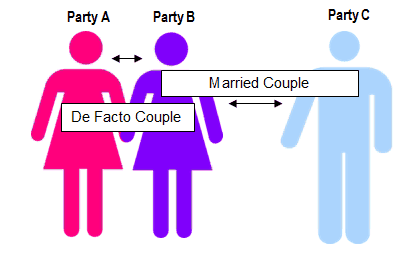FAMILY LAW: Dating or De Facto – The Dilemma
Whilst the letter of the law may be black and white, applying the law and how it works in day to day practise is often a very grey area. Deciding whether parties are in a de facto relationship or not can be a real dilemma. Below is some information to guide you through…
When Can Parties Be in a De Facto Relationship ?
According to The Family Law Act a person can be in a de facto relationship if:
- they are not legally married to each other; and
- they are not related by family; and
- they have a relationship as a couple living together on a genuine domestic basis;
- they are two people of difference sexes, or two people of the same sex;
- one person in the de facto relationship is legally married to a third party, or to a person in another de facto relationship.[1]

Example: Female A and Female B (not related by family) could be in de facto relationship even if Female B and Male C are married.
How Do We Know When Parties are in a De Facto Relationship ?
Below are some of the circumstances the Court considers to decide if parties are in a De Facto relationship:
- The duration of the relationship
- The nature and extent of the common residence
- Whether a sexual relationship exists – this doesn’t necessarily mean the parties must be having sex, it can include intimacy or intention to have sex
- The degree of financial dependence or interdependence, and any arrangements for financial support
- The degree of mutual commitment to a shared life
- The care and support of children
- The reputation and public aspects of the relationship[2]
- No one circumstance is regarded as necessary to determine if parties are in a De Facto relationship. It is not a case that all of the above circumstances need to exist before parties can be in a found to be in a de facto relationship.
- The Court has a wide discretion as to the weight it attaches to any one factor in deciding if parties are in a De Facto relationship.
What Happens if the Court decides the Parties are NOT in a De Facto Relationship ?
If the Court holds that the parties are not in a De Facto relationship, then the Court will not make an Order for a property settlement or spousal maintenance under the Family Law Act.
What Happens if the Court decides the Parties ARE in a De Facto Relationship
If the Court holds that the parties are in a De Facto relationship, the Court may then make an Order in relation to property settlement however, this Order may be that each party keeps the assets and liabilities in their possession and there is no alteration of any property interest [i.e. property is not transferred from one party to another].
A Court may only exercise its discretion to make an Order for altering the property interests or an Order for Spousal maintenance of a De Facto relationship if the Court is satisfied:
(a) The period or the total of time of the De Facto relationship is at least two (2) years; or
(b) There is a child of the De Facto relationship; or
(c) That a party to the relationship has made a substantial contribution and if the Court did not make an Order it would be a serious injustice to that party; or
(d) The relationship is registered under prescribed Territory or State.[3]
Don’t be deceived about What De Facto Relationships look like
With 1.9 million adults in Australia living as De Facto couples, there is a wide scope for dealing with this grey area of family law and defining a De Facto relationship.
Some interesting decisions by Court in decided De Facto relationships include:
- J v W – a 17 year relationship where the man contributed $24,000 and made other financial support to a woman who he spent regular weekends and holidays with. The man was still married to his wife. The Court held there was a lack of the public aspect to the relationship therefore held the parties were not a De Facto couple.[4]
- S v S – a relationship that lasted less than two years. There was a substantial mixing of money but the couple had never had sex. The Court held that a sexual relationship includes intimacy and the intention to have sex therefore they were found to be in a De Facto relationship.[5]
If you are unsure as to whether you are in a De Facto relationship and / or you want to seek advice about family law matters, contact the McLaughlins’ office on (07) 5591 5099, and speak to Joelene Nel.[6]
[1] Family Law Act 1975 (“FLA”) CTH section 4AA(1) and (5)
[2] FLA section 4AA(2)
[3] FLA section 90SB
[4] Jonah v White 2012 FAM CAFC200
[5] Spencer and Speight [2014] FamCA 436
[6] With thanks to Caroline Reid [PLT student] for her assistance in preparation of this article.
Author: Joelene Nel
Director: Sophie Pearson
Date: 13/10/2016

